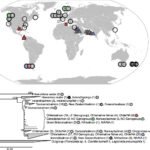By Felipe Miranda*
Chile – Vaccines do not protect all fish families equally; this would explain the systematic failure observed in salmon vaccines against the pathogenic bacterium Piscirickettsia salmonis and the use of antibiotics to treat this pathogen.
Recently published in the prestigious magazine Scientific Report of the publisher Nature, the study was carried out by an international team of researchers from Chile, Spain (Universidad de las Palmas de Gran Canaria) and Canada (University of Waterloo). This study shows an interesting new finding that relates the efficacy of vaccines to the genetic variability of fish at the family level.
“What we did in our study was to compare, at the population and family level, the efficacy of salmon vaccines against the bacterium P. salmonis, cause of the disease called Piscirickettsiosis, which accounts for almost 95% of all antibiotics applied in farmed salmon in Chile” Dr. Figueroa, postdoctoral researcher at the Pontificia Universidad Católica of Valparaíso (Chile) explains. “Our results are conclusive; the vaccines did not work properly in many of the 200 families evaluated.”
“In fact, we observed a great genetic variability within the fish. In some families the protection added by vaccines was significant, but in others the protection was literally zero or even negative, despite following the strict vaccination protocols of pharmaceutical companies”, according to Dr. Pablo Conejeros, academic at Universidad de Valparaíso.
Dr. José Gallardo, academic and the study leader adds: “Our study included a large number of siblings per family. Half of them were injected with the vaccine and half were injected with a placebo and used as a control group. This allowed us to compare the effectiveness of the vaccines at the family level, which was the main novelty of this study in respect to others previously published”. “Our results show that some families of fish become resistant to Piscirickettsiosis when vaccinated, but others that were resistant without vaccines now become susceptible, which was really astounding” he points out.
Effectiveness of vaccines: public or private information?
In the opinion of Dr. Gallardo “vaccine efficacy studies must be peer reviewed and public as in vaccine developed for humans, and must consider the genetic heterogeneity of the host as our study did.” Unfortunately, in the current situation, neither the pharmaceutical companies, nor the Agricultural and Livestock Service (SAG in Chile) publicly release the efficacy studies with which the marketing of fish vaccines is authorized in Chile. This prevented us from comparing our results with the studies carried out by pharmaceutical companies. In fact, we do not know if the most vulnerable groups of the populations have been included in the vaccine efficacy studies, as recommended by the World Organization for Animal Health (OIE).”
Regarding how to improve the efficacy of vaccines and reduce the use of antibiotics, Dr. Conejeros responds “Now, given that the differences between families that we observed in our study were heritable, we propose to improve the effectiveness of the vaccines through the artificial selection of vaccinated fish resistant to infection by P. salmonis”.
Reference (open access):
Figueroa, C., Veloso, P., Espin, L. et al. Host genetic variation explains reduced protection of commercial vaccines against Piscirickettsia salmonis in Atlantic salmon. Sci Rep 10, 18252 (2020). https://www.nature.com/articles/s41598-020-70847-9
Stay Always Informed
Join our communities to instantly receive the most important news, reports, and analysis from the aquaculture industry.
*Source: Journalist, Pontificia Universidad Católica of Valparaíso
Editor at the digital magazine AquaHoy. He holds a degree in Aquaculture Biology from the National University of Santa (UNS) and a Master’s degree in Science and Innovation Management from the Polytechnic University of Valencia, with postgraduate diplomas in Business Innovation and Innovation Management. He possesses extensive experience in the aquaculture and fisheries sector, having led the Fisheries Innovation Unit of the National Program for Innovation in Fisheries and Aquaculture (PNIPA). He has served as a senior consultant in technology watch, an innovation project formulator and advisor, and a lecturer at UNS. He is a member of the Peruvian College of Biologists and was recognized by the World Aquaculture Society (WAS) in 2016 for his contribution to aquaculture.







